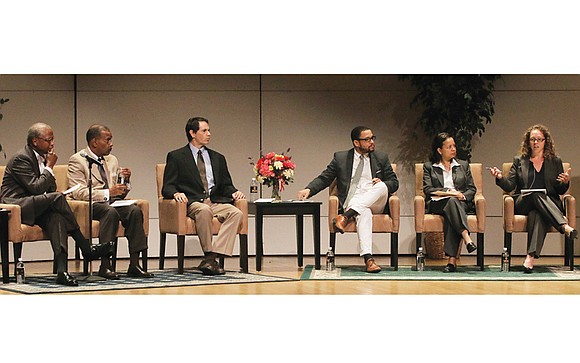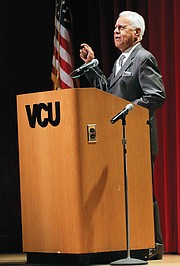Problems of the 1960s still plague black community
10/22/2016, 4:06 p.m.
By Holly Rodriguez
The problems driving dissatisfaction among African-Americans in the 1960s — discriminatory police practices, unemployment, unequal pay, poverty and more — continue to plague many people in the African-American community today.
That was the assessment of Dr. Elsie Harper-Anderson, assistant professor of Urban and Regional Planning at the L. Douglas Wilder School of Government and Public Affairs at Virginia Commonwealth University.
She and a panel of experts spoke Monday at the daylong Wilder Symposium at VCU.
The theme: “Race and American Society: 50 Years After the Kerner Commission Report.”
The Kerner Commission Report was ordered by President Lyndon B. Johnson to investigate the cause of riots in several U.S. cities in the summer of 1967. Completed in March 1968, the commission identified 164 “disorders” contributing to the civil unrest and advised immediate action.
The Wilder Symposium explored the commission’s recommendations, whether they were implemented, and the report’s influence on race relations and equality today.
“The freedoms and opportunities of all Americans are diminished and imperiled when they are denied to some Americans,” the report stated. The “unrecoverable loss to the nation which this denial has already caused — and continues to produce — no longer can be ignored or afforded.”
Dr. Harper-Anderson said she was most “struck by the fact that I could take the dates out (of the 1968 report) and the information applies to today.”
A study of area residents’ perspectives on race relations, conducted by the Center for Public Policy at the Wilder School, indicates that 72 percent of Richmond area residents believe race relations in the United States is a major problem and has gotten worse in the last five years.
While residents are concerned about race, 60 percent believe that the police in their community are doing a good job, the study found.
Former Gov. L. Douglas Wilder, 85, after whom the symposium is named, offered a personal narrative to provide a snapshot of African-American life in Richmond as he was growing up.
“If we are going to move toward a more perfect union, the truth of the times must be told,” he said.
That truth includes the poor public grade schools Gov. Wilder said he attended, with hand-me-down books, an outhouse for a bathroom, no cafeteria and no gym.
The ability to excel, he continued, came from the teachers and professors who nurtured him and other leaders.
As he remembered the leaders of racial justice from the past, he left the audience with the question, “Where are our leaders today?”
Joe Madison, Sirius/XM Satellite Radio talk show host, said leadership starts at home, and called upon African-American families to root education in homes, churches, communities and prisons.
“Education is the new currency of the 21st century,” he said. In the future, “there will be those who are educated and those who or not.” The suffering of the uneducated will only continue to expand, he said.
Panel discussions included expanding education and leadership. Distribution of power and resources, the role of faculty in student civic engagement and the relationship between the police and the communities they serve also were addressed.
In order to improve the African-American community’s relationship with police, said Dr. William V. Pelfrey Jr., associate professor in the Wilder School’s Criminal Justice Program, “the police need to be able to admit when they have made a mistake.”
“This is a sacrifice for them,” he said, “but this is the start to be able to resuscitate these relationships.”
Congressman Robert C. “Bobby” Scott, who formerly represented Richmond in the 3rd Congressional District, said the need for criminal justice reform is critical, with the police practice of aggressive patrolling is the first of many problems that needs to be addressed.
“Massive incarceration is creating crime … because so many children are being raised … with their parents in jail,” he said.
Proper police training, body cameras for police and youth programs are among the suggested solutions he offered.
The Nov. 8 elections are an opportunity to move toward the resolutions outlined in the Kerner Commission Report.
“Jobs, funding education and criminal justice reform are key in the 2016 elections,” he said.








